- Home
- D. H. Lawrence
D H Lawrence- The Dover Reader Page 2
D H Lawrence- The Dover Reader Read online
Page 2
George Coppard was bitterly galled by his own poverty. He became foreman of the engineers in the dockyard at Sheerness. Mrs. Morel—Gertrude—was the second daughter. She favoured her mother, loved her mother best of all; but she had the Coppards’ clear, defiant blue eyes and their broad brow. She remembered to have hated her father’s overbearing manner towards her gentle, humorous, kindly-souled mother. She remembered running over the breakwater at Sheerness and finding the boat. She remembered to have been petted and flattered by all the men when she had gone to the dockyard, for she was a delicate, rather proud child. She remembered the funny old mistress, whose assistant she had become, whom she had loved to help in the private school. And she still had the Bible that John Field had given her. She used to walk home from chapel with John Field when she was nineteen. He was the son of a well-to-do tradesman, had been to college in London, and was to devote himself to business.
She could always recall in detail a September Sunday afternoon, when they had sat under the vine at the back of her father’s house. The sun came through the chinks of the vine-leaves and made beautiful patterns, like a lace scarf, falling on her and on him. Some of the leaves were clean yellow, like yellow flat flowers.
“Now sit still,” he had cried. “Now your hair, I don’t know what it is like! It’s as bright as copper and gold, as red as burnt copper, and it has gold threads where the sun shines on it. Fancy their saying it’s brown. Your mother calls it mouse-colour.”
She had met his brilliant eyes, but her clear face scarcely showed the elation which rose within her.
“But you say you don’t like business,” she pursued.
“I don’t. I hate it!” he cried hotly.
“And you would like to go into the ministry,” she half implored.
“I should. I should love it, if I thought I could make a first-rate preacher.”
“Then why don’t you—why don’t you?” Her voice rang with defiance. “If I were a man, nothing would stop me.”
She held her head erect. He was rather timid before her.
“But my father’s so stiff-necked. He means to put me into the business, and I know he’ll do it.”
“But if you’re a man?” she had cried.
“Being a man isn’t everything,” he replied, frowning with puzzled helplessness.
Now, as she moved about her work at the Bottoms, with some experience of what being a man meant, she knew that it was not everything.
At twenty, owing to her health, she had left Sheerness. Her father had retired home to Nottingham. John Field’s father had been ruined; the son had gone as a teacher in Norwood. She did not hear of him until, two years later, she made determined inquiry. He had married his landlady, a woman of forty, a widow with property.
And still Mrs. Morel preserved John Field’s Bible. She did not now believe him to be—Well, she understood pretty well what he might or might not have been. So she preserved his Bible, and kept his memory intact in her heart, for her own sake. To her dying day, for thirty-five years, she did not speak of him.
When she was twenty-three years old, she met, at a Christmas party, a young man from the Erewash Valley. Morel was then twenty-seven years old. He was well set-up, erect, and very smart. He had wavy black hair that shone again, and a vigorous black beard that had never been shaved. His cheeks were ruddy, and his red, moist mouth was noticeable because he laughed so often and so heartily. He had that rare thing, a rich, ringing laugh. Gertrude Coppard had watched him, fascinated. He was so full of colour and animation, his voice ran so easily into comic grotesque, he was so ready and so pleasant with everybody. Her own father had a rich fund of humour, but it was satiric. This man’s was different: soft, non-intellectual, warm, a kind of gambolling.
She herself was opposite. She had a curious, receptive mind, which found much pleasure and amusement in listening to other folk. She was clever in leading folk on to talk. She loved ideas, and was considered very intellectual. What she liked most of all was an argument on religion or philosophy or politics with some educated man. This she did not often enjoy. So she always had people tell her about themselves, finding her pleasure so.
In her person she was rather small and delicate, with a large brow, and dropping bunches of brown silk curls. Her blue eyes were very straight, honest, and searching. She had the beautiful hands of the Coppards. Her dress was always subdued. She wore dark blue silk, with a peculiar silver chain of silver scallops. This, and a heavy brooch of twisted gold, was her only ornament. She was still perfectly intact, deeply religious, and full of beautiful candour.
Walter Morel seemed melted away before her. She was to the miner that thing of mystery and fascination, a lady. When she spoke to him, it was with a southern pronunciation and a purity of English which thrilled him to hear. She watched him. He danced well, as if it were natural and joyous in him to dance. His grandfather was a French refugee who had married an English barmaid—if it had been a marriage. Gertrude Coppard watched the young miner as he danced, a certain subtle exultation like glamour in his movement, and his face the flower of his body, ruddy, with tumbled black hair, and laughing alike whatever partner he bowed above. She thought him rather wonderful, never having met anyone like him. Her father was to her the type of all men. And George Coppard, proud in his bearing, handsome, and rather bitter; who preferred theology in reading, and who drew near in sympathy only to one man, the Apostle Paul; who was harsh in government, and in familiarity ironic; who ignored all sensuous pleasure;—he was very different from the miner. Gertrude herself was rather contemptuous of dancing; she had not the slightest inclination towards that accomplishment, and had never learned even a Roger de Coverley. She was a puritan, like her father, high-minded, and really stern. Therefore the dusky, golden softness of this man’s sensuous flame of life, that flowed off his flesh like the flame from a candle, not baffled and gripped into incandescence by thought and spirit as her life was, seemed to her something wonderful, beyond her.
He came and bowed above her. A warmth radiated through her as if she had drunk wine.
“Now do come and have this one wi’ me,” he said caressively. “It’s easy, you know. I’m pining to see you dance.”
She had told him before she could not dance. She glanced at his humility and smiled. Her smile was very beautiful. It moved the man so that he forgot everything.
“No, I won’t dance,” she said softly. Her words came clean and ringing.
Not knowing what he was doing—he often did the right thing by instinct—he sat beside her, inclining reverentially.
“But you mustn’t miss your dance,” she reproved.
“Nay, I don’t want to dance that—it’s not one as I care about.”
“Yet you invited me to it.”
He laughed very heartily at this.
“I never thought o’ that. Tha’rt not long in taking the curl out of me.”
It was her turn to laugh quickly.
“You don’t look as if you’d come much uncurled,” she said.
“I’m like a pig’s tail, I curl because I canna help it,” he laughed, rather boisterously.
“And you are a miner!” she exclaimed in surprise.
“Yes. I went down when I was ten.”
She looked at him in wondering dismay.
“When you were ten! And wasn’t it very hard?” she asked.
“You soon get used to it. You live like th’ mice, an’ you pop out at night to see what’s going on.”
“It makes me feel blind,” she frowned.
“Like a moudiwarp!” he laughed. “Yi, an’ there’s some chaps as does go round like moudiwarps.” He thrust his face forward in the blind snout-like way of a mole, seeming to sniff and peer for direction. “They dun though!” he protested naîvely. “Tha niver seed such a way they get in. But tha mun let me ta’e thee down some time, an’ tha can see for thysen.”
She looked at him, startled. This was a new tract of life suddenly opened before her. She rea
lized the life of the miners, hundreds of them toiling below earth and coming up at evening. He seemed to her noble. He risked his life daily, and with gaiety. She looked at him, with a touch of appeal in her pure humility.
“Shouldn’t ter like it?” he asked tenderly. “’Appen not, it ’ud dirty thee.”
She had never been “thee’d” and “thou’d” before.
The next Christmas they were married, and for three months she was perfectly happy: for six months she was very happy.
He had signed the pledge, and wore the blue ribbon of a teetotaller: he was nothing if not showy. They lived, she thought, in his own house. It was small, but convenient enough, and quite nicely furnished, with solid worthy stuff that suited her honest soul. The women, her neighbours, were rather foreign to her, and Morel’s mother and sisters were apt to sneer at her ladylike ways. But she could perfectly well live by herself, so long as she had her husband close.
Sometimes, when she herself wearied of love-talk, she tried to open her heart seriously to him. She saw him listen deferentially, but without understanding. This killed her efforts at a finer intimacy, and she had flashes of fear. Sometimes he was restless of an evening: it was not enough for him just to be near her, she realized. She was glad when he set himself to little jobs.
He was a remarkably handy man—could make or mend anything. So she would say:
“I do like that coal-rake of your mother’s—it is small and natty.”
“Does ter, my wench? Well, I made that, so I can make thee one.”
“What! why it’s a steel one!”
“An’ what if it is! Tha s’lt ha’e one very similar, if not exactly same.”
She did not mind the mess, nor the hammering and noise. He was busy and happy.
But in the seventh month, when she was brushing his Sunday coat, she felt papers in the breast-pocket, and, seized with a sudden curiosity, took them out to read. He very rarely wore the frock-coat he was married in: and it had not occurred to her before to feel curious concerning the papers. They were the bills of the household furniture, still unpaid.
“Look here,” she said at night, after he was washed and had had his dinner. “I found these in the pocket of your wedding-coat. Haven’t you settled the bills yet?”
“No. I haven’t had a chance.”
“But you told me all was paid. I had better go into Nottingham on Saturday and settle them. I don’t like sitting on another man’s chairs and eating from an unpaid table.”
He did not answer.
“I can have your bank-book, can’t I?”
“Tha can ha’e it, for what good it’ll be to thee.”
“I thought—” she began. He had told her he had a good bit of money left over. But she realized it was no use asking questions. She sat rigid with bitterness and indignation.
The next day she went down to see his mother.
“Didn’t you buy the furniture for Walter?” she asked.
“Yes, I did,” tartly retorted the elder woman.
“And how much did he give you to pay for it?”
The elder woman was stung with fine indignation.
“Eighty pound, if you’re so keen on knowin’,” she replied.
“Eighty pounds! But there are forty-two pounds still owing!”
“I can’t help that.”
“But where has it all gone?”
“You’ll find all the papers, I think, if you look—beside ten pound as he owed me, an’ six pound as the wedding cost down here,”
“Six pounds!” echoed Gertrude Morel. It seemed to her monstrous that, after her own father had paid so heavily for her wedding, six pounds more should have been squandered in eating and drinking at Walter’s parents’ house, at his expense.
“And how much has he sunk in his houses?” she asked.
“His houses—which houses?”
Gertrude Morel went white to the lips. He had told her the house he lived in, and the next one, were his own.
“I thought the house we live in—” she began.
“They’re my houses, those two,” said the mother-in-law. “And not clear either. It’s as much as I can do to keep the mortgage interest paid.”
Gertrude sat white and silent. She was her father now.
“Then we ought to be paying you rent,” she said coldly.
“Walter is paying me rent,” replied the mother.
“And what rent?” asked Gertrude.
“Six-and-six a week,” retorted the mother.
It was more than the house was worth. Gertrude held her head erect, looked straight before her.
“It is lucky to be you,” said the elder woman, bitingly, “to have a husband as takes all the worry of the money, and leaves you a free hand.”
The young wife was silent.
She said very little to her husband, but her manner had changed towards him. Something in her proud, honourable soul had crystallized out hard as rock.
When October came in, she thought only of Christmas. Two years ago, at Christmas, she had met him. Last Christmas she had married him. This Christmas she would bear him a child.
“You don’t dance yourself, do you, missis?” asked her nearest neighbour, in October, when there was great talk of opening a dancing-class over the Brick and Tile Inn at Bestwood.
“No—I never had the least inclination to,” Mrs. Morel replied.
“Fancy! An’ how funny as you should ha’ married your Mester. You know he’s quite a famous one for dancing.”
“I didn’t know he was famous,” laughed Mrs. Morel.
“Yea, he is though! Why, he run that dancing-class in the Miners’ Arms club-room for over five year.”
“Did he?”
“Yes, he did.” The other woman was defiant. “An’ it was thronged every Tuesday, and Thursday, an’ Sat’day—an’ there was carryin’s-on, accordin’ to all accounts.”
This kind of thing was gall and bitterness to Mrs. Morel, and she had a fair share of it. The women did not spare her, at first; for she was superior, though she could not help it.
He began to be rather late in coming home.
“They’re working very late now aren’t they?” she said to her washer-woman.
“No later than they allers do, I don’t think. But they stop to have their pint at Ellen’s, an’ they get talkin’, an’ there you are! Dinner stone cold—an’ it serves ’em right.”
“But Mr. Morel does not take any drink.”
The woman dropped the clothes, looked at Mrs. Morel, then went on with her work, saying nothing.
Gertrude Morel was very ill when the boy was born. Morel was good to her, as good as gold. But she felt very lonely, miles away from her own people. She felt lonely with him now, and his presence only made it more intense.
The boy was small and frail at first, but he came on quickly. He was a beautiful child with dark gold ringlets, and dark-blue eyes which changed gradually to a clear gray. His mother loved him passionately. He came just when her own bitterness of disillusion was hardest to bear; when her faith in life was shaken, and her soul felt dreary and lonely. She made much of the child and the father was jealous.
At last Mrs. Morel despised her husband. She turned to the child; she turned from the father. He had begun to neglect her; the novelty of his own home was gone. He had no grit, she said bitterly to herself. What he felt just at the minute, that was all to him. He could not abide by anything. There was nothing at the back of all his show.
There began a battle between the husband and wife—a fearful, bloody battle that ended only with the death of one. She fought to make him undertake his own responsibilities, to make him fulfil his obligations. But he was too different from her. His nature was purely sensuous, and she strove to make him moral, religious. She tried to force him to face things. He could not endure it—it drove him out of his mind.
While the baby was still tiny, the father’s temper had become so irritable that it was not to be trusted. The child had only to
give a little trouble when the man began to bully. A little more, and the hard hands of the collier hit the baby. Then Mrs. Morel loathed her husband, loathed him for days; and he went out and drank; and she cared very little what he did. Only, on his return, she scathed him with her satire.
The estrangement between them caused him, knowingly or unknowingly, grossly to offend her where he would not have done.
William was only one year old and his mother was proud of him, he was so pretty. She was not well off now, but her sisters kept the boy in clothes. Then, with his little white hat curled with an ostrich feather, and his white coat, he was a joy to her, the twining wisps of hair clustering round his head. Mrs. Morel lay listening, one Sunday morning, to the chatter of the father and child downstairs. Then she dozed off. When she came downstairs, a great fire glowed in the grate, the room was hot, the breakfast was roughly laid, and seated in his arm-chair, against the chimney-piece, sat Morel, rather timid; and standing between his legs, the child—cropped like a sheep, with such an odd round poll—looking wondering at her; and on a newspaper spread out upon the hearthrug, a myriad of crescent-shaped curls, like the petals of a marigold scattered in the reddening firelight.
Mrs. Morel stood still. It was her first baby. She went very white, and was unable to speak.
“What dost think o’ ’im?” Morel laughed uneasily.
She gripped her two fists, lifted them, and came forward. Morel shrank back.
“I could kill you, I could!” she said. She choked with rage, her two fists uplifted.
“Yer non want ter make a wench on ’im,” Morel said, in a frightened tone, bending his head to shield his eyes from hers. His attempt at laughter had vanished.
The mother looked down at the jagged, close-clipped head of her child. She put her hands on his hair, and stroked and fondled his head.
“Oh—my boy!” she faltered. Her lip trembled, her face broke, and, snatching up the child, she buried her face in his shoulder and cried painfully. She was one of those women who cannot cry; whom it hurts as it hurts a man. It was like ripping something out of her, her sobbing.

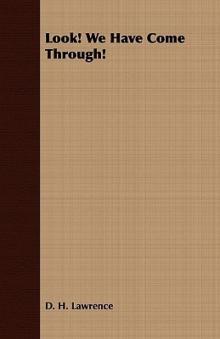 Look! We Have Come Through!
Look! We Have Come Through!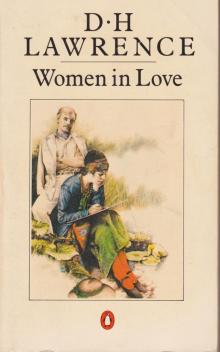 Women in Love
Women in Love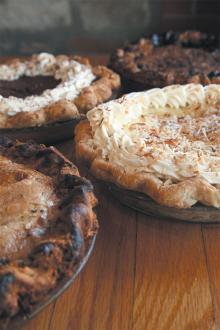 The Ladybird
The Ladybird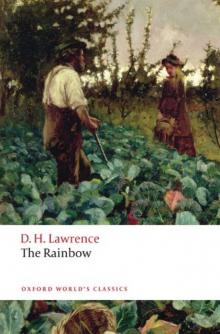 The Rainbow
The Rainbow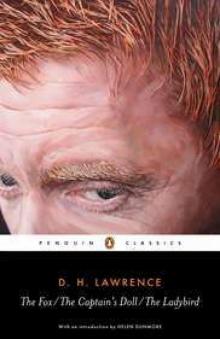 The Captain's Dol
The Captain's Dol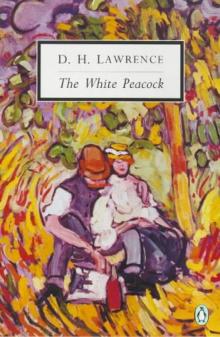 The White Peacock
The White Peacock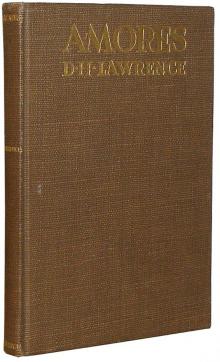 Amores
Amores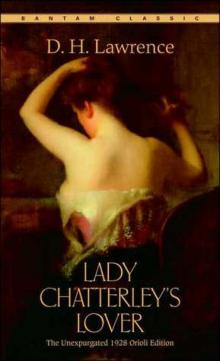 Lady Chatterley's Lover
Lady Chatterley's Lover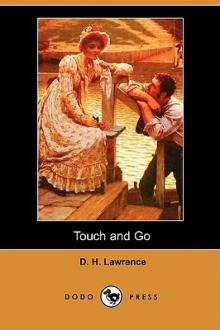 Touch and Go
Touch and Go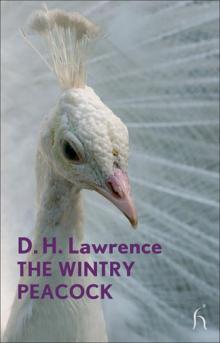 The Wintry Peacock
The Wintry Peacock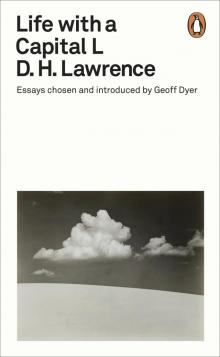 Life with a Capital L
Life with a Capital L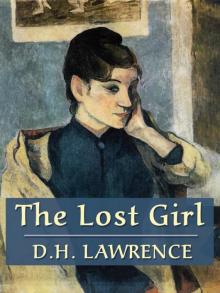 The Lost Girl
The Lost Girl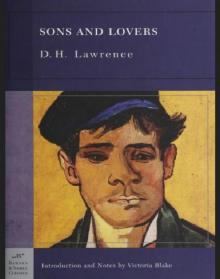 Sons and Lovers
Sons and Lovers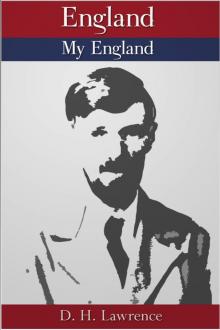 England, My England
England, My England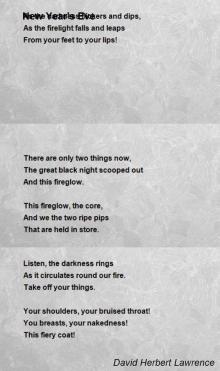 New Poems
New Poems Twilight in Italy
Twilight in Italy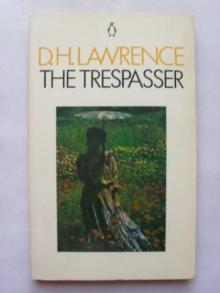 The Trespasser
The Trespasser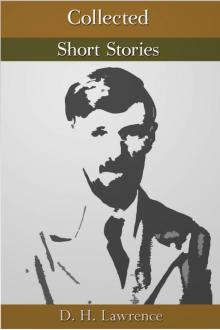 The Collected Short Stories
The Collected Short Stories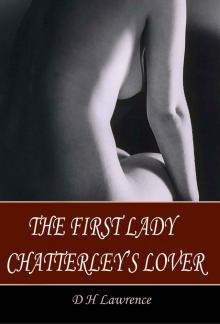 The First Lady Chatterley's Lover
The First Lady Chatterley's Lover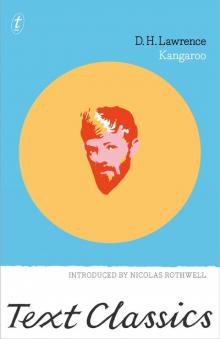 Kangaroo
Kangaroo Bay
Bay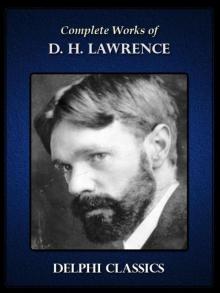 Complete Works of D.H. Lawrence
Complete Works of D.H. Lawrence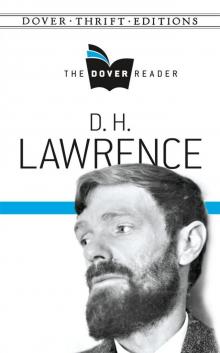 D H Lawrence- The Dover Reader
D H Lawrence- The Dover Reader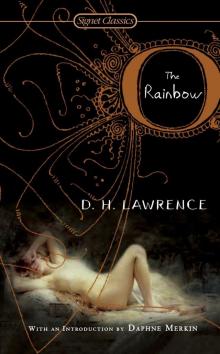 The Rainbow (100th Anniversary ed.)
The Rainbow (100th Anniversary ed.)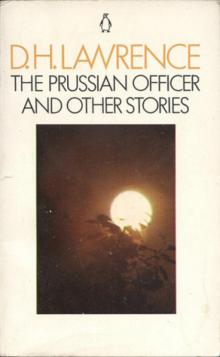 The Prussian Officer
The Prussian Officer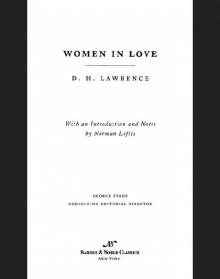 Women in Love (Barnes & Noble Classics Series)
Women in Love (Barnes & Noble Classics Series)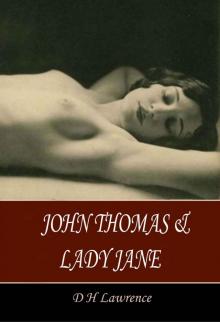 John Thomas and Lady Jane
John Thomas and Lady Jane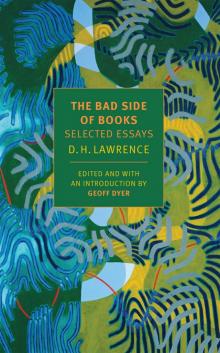 The Bad Side of Books
The Bad Side of Books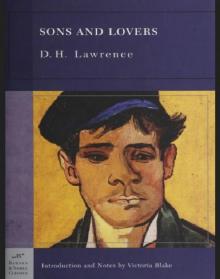 Sons and Lovers (Barnes & Noble Classics Series)
Sons and Lovers (Barnes & Noble Classics Series) Selected Stories
Selected Stories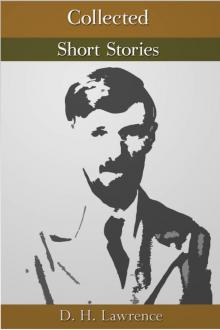 Collected Short Stories
Collected Short Stories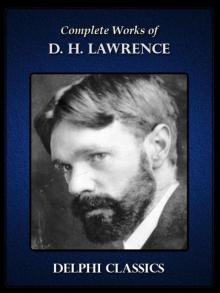 Complete Works of D.H. Lawrence (Illustrated)
Complete Works of D.H. Lawrence (Illustrated)